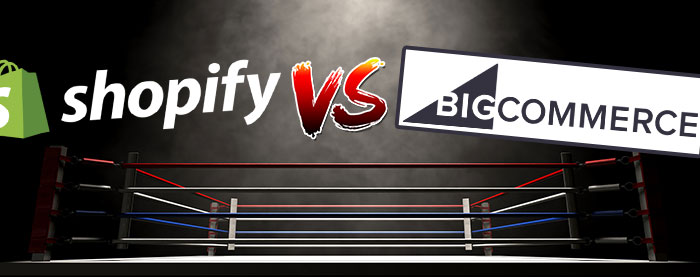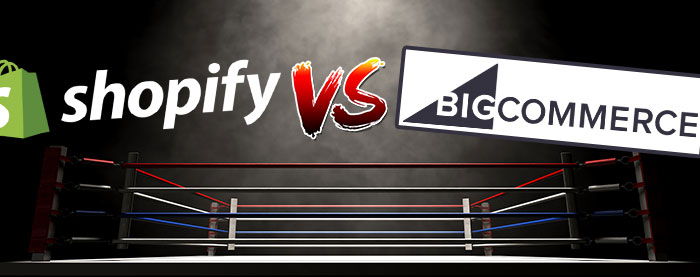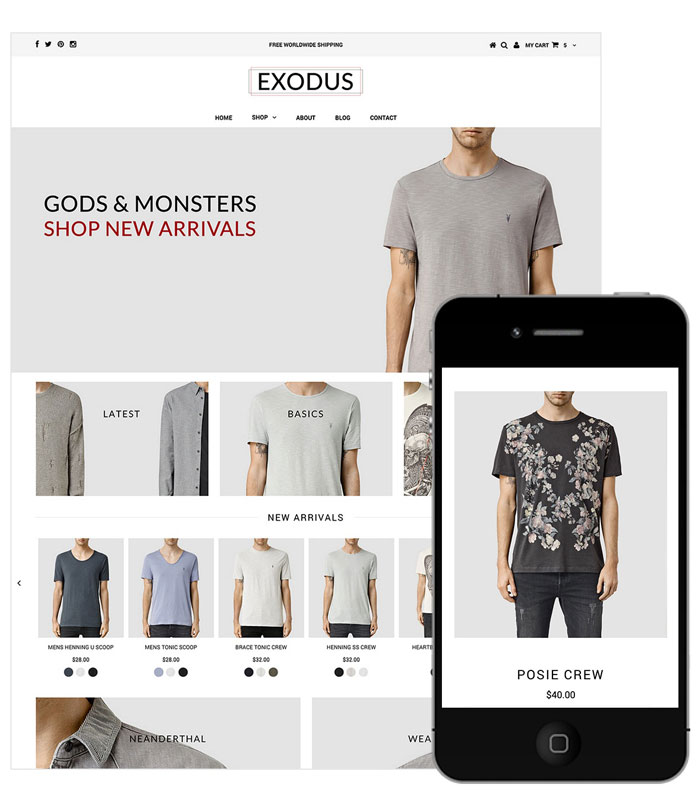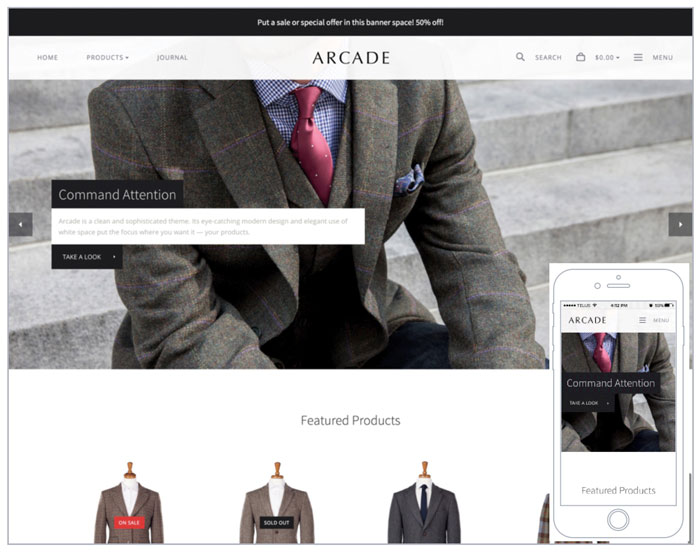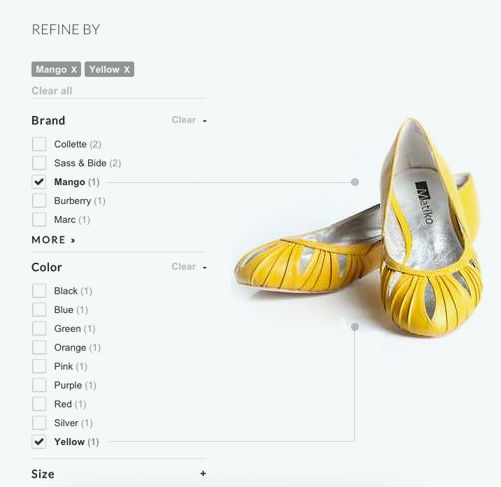NOTE: Review last updated May 15, 2017.
In the land of e-commerce stores (aka “Shopping Carts”), there are tons of options. Two online store providers that have risen to the top of the pile and won over hundreds of thousands of happy store owners are BigCommerce and Shopify. These two companies have done the right things over the past few years to become a first choice for solo-prenuers, small businesses, and large corporations alike.
So if you’re looking for a large, stable, feature-rich online store that won’t need a ton of maintenance and babysitting, you’ve come to the right place.
Here’s the thing: if you peruse the sales pages for both Shopify and BigCommerce, it’s pretty easy to get overwhelmed by the laundry list of features, price tables, and App Store options, especially if choosing and working with software isn’t your “thing”. (If it makes you feel any better, I’ve been in the software field since 1995, and I too have to take a deep breath when I hit some of these software product feature pages). So what happens? You might shut down entirely and not make a decision, and off to Facebook you go. Or, you make a quick decision because you like the look of a particular design Theme on one of the stores, forgetting to check that the Shopping Cart provider that you chose has a particular feature that you really, really need to give your products the best possible chance of selling. No Bueno.
So we’re here to help. At Clarity Lab, we’re dedicated to providing you with free, in-depth software product reviews and comparisons between the products. And, we write these reviews from the perspective of a business owner who needs to USE the tool on a daily basis (not just talking about features, but how the features actually apply to “real-life” scenarios.) We take the time to use the tools and really get into the nitty gritty. Note: if you end up choosing one of the tools that we review on our site, we do get an affiliate revenue from the software company, as a small token for the time we’ve put into helping you make your important decision. That being said, we write all of these reviews and comparisons impartial of any affiliate revenue, because we get a commission from all of them, so it doesn’t matter to us what you choose, as long as it’s right for your business. That’s our goal. OK, so let’s get started – Shopify VS BigCommerce!
Design
Good design (“look and feel”) templates are critical for an e-commerce store. Visitors to your store will be picky and expect an updated design that is error-free and looks good on mobile devices. Moreover, a store must feel “trustworthy” to your users or you’ll never get them to click on the “Checkout” button because they’ll be afraid to hand over their credit card information to any website that doesn’t seem 100% credible. So needless to say, design matters.
Here is an example theme from both Shopify and BigCommerce:
Both Shopify and BigCommerce have many free design templates and a bevy of paid ones:
| Free Themes | Paid Themes | |
| BigCommerce | 7 | 76+ |
| Shopify | 27 | 150+ |
The themes give you a professional look and feel for the site right away without any custom programming. Both Shopify and BigCommerce have some of the best-looking themes in the business (most of the paid/premium themes from Shopify are created by boutique web design firms and their quality reflects that).
The paid themes offered for BigCommerce range between $145 – $235, where Shopify’s themes cost between $100 – $180. Obviously, the upper end of this range is pricey, but it can be well worth it if the paid theme gives you a polished appearance and user experience. And, you’re getting hours upon hours of work from a web designer built into a package at a price that is equivalent to one hour of an experienced web designer’s time.
Overall, I wouldn’t choose a store platform specifically for a particular theme, but I do think it is a critical decision factor, right after features and pricing. That being said, I think it will be hard to go wrong with a theme from either Shopify or BigCommerce, and I’m confident both platforms offer themes that would suit most online businesses as a starting place.
Basic Features
Speaking of features, next to price I think this is the most critical area to assess when choosing between Shopify and BigCommerce. Here I’m going to use an analogy: when it comes to features, Shopify is like a Lear Jet and BigCommerce is like a Boeing 737.
 Both Shopify and BigCommerce are fast and capable of getting you where you need to go. To me, Shopify has a more streamlined feature set, just the right features in most cases to get you to your destination. BigCommerce on the other hand, they have every switch and knob built into their feature set, and so if you’re a knob twister, this will make you very happy. I’m not saying that BigCommerce’s feature set is more bloated, rather there seems to be more control over it.
Both Shopify and BigCommerce are fast and capable of getting you where you need to go. To me, Shopify has a more streamlined feature set, just the right features in most cases to get you to your destination. BigCommerce on the other hand, they have every switch and knob built into their feature set, and so if you’re a knob twister, this will make you very happy. I’m not saying that BigCommerce’s feature set is more bloated, rather there seems to be more control over it.
I’m not going to do a feature by feature comparison in this short review (if you would like this, please comment below and I’ll get to it). But, if you would like to really dive into the guts of both Shopify and BigCommerce’s features, you can do so at the following links:
The Ultimate Shopify Review (2016) – Clarity Lab
The Ultimate BigCommerce Review (2016) – Clarity Lab
One more item of note: while BigCommerce offers a little more in the way of “out of the box” tools in their product, both BigCommerce and Shopify have extensive App Stores. What this means is that you can add “apps” to your online store to add additional functionality to the store (sometimes for free, sometimes paid). The point here is, if you have a specific need (for example, the need to offer Recurring Payment plans) for your store, you would be well advised to take a look for Apps that add the functionality to your store, before making your final choice. Most of the Apps in both stores are created/supported by outside developers and are usually well-done.
Ability to Handle Complex Products
I put this section in here because it’s an important part of where Shopify and BigCommerce differ. I feel that BigCommerce more elegantly handles complex product options than Shopify does. For example, you can easily reuse a set of product options across existing multiple products in BigCommerce whereas with Shopify you can only copy a product’s options to a new product, not a pre-existing one. The need to update product options typically comes into play if you need to make changes to an entire line of products at once.
BigCommerce also offers product filtering (also referred to as Faceted Search) on category pages (albeit only in their Enterprise plan) which you cannot get at all with Shopify (without expensive add-on apps starting in the $300/month dollar range). In my opinion, this is a big ding in the Shopify armor, and stores with a large inventory should think twice about choosing an online store platform that doesn’t allow your customers to filter products based on custom properties of your items (for example, “TV Screen Size” for a consumer electronics retailer would always have a “Screen Size” filter on the left side of the category page, and you can’t do this out-of-the-box with Shopify (at this time).
Now to be fair, you do have to pay more to be on the BigCommerce Enterprise plan, but you also get all of their top of the line features with the Enterprise plan, such as sitewide HTTPS, ShipperHQ integration and more. How much more is negotiated between you and your BigCommerce representative.
EDIT: There is now one supported Shopify Theme that supports sidebar filtering, called Supply. You can view it here. However, to set up the filters is very time intensive and requires knowledge of and use of csv file importing for your products. So, it’s a pretty “klunky” implementation of filtering, but it does work.
Customer Service
Both tools have excellent customer service and high availability. I don’t think either store has a leg up here. I’ve called and online chatted with both Shopify and BigCommerce help teams and never had a problem getting qualified people to answer all of my questions and give me guidance on what was (and wasn’t) possible in my store. I even escalated a help ticket with BigCommerce who found an error in my theme modifications that I thought was a bug. Thumbs Up.
Overall, Customer Service rounds out at a Tie for Shopify and BigCommerce, with both having excellent teams and great service.
Pricing
Both Shopify and BigCommerce have similar pricing levels for standard online store offerings. However, Shopify does offer “Shopify Lite”, which allows you to sell your products on existing websites and social media channels (for example, if you just wanted to add your products to your existing WordPress website).
Current Pricing Plans:
| Shopify Plan / BigCommerce Plan | Shopify | BigCommerce |
|---|---|---|
| Lite (no online store) | $9 / month | Not Available |
| Basic / Standard | $29 / month | $29.95 / month |
| Shopify / Plus | $79 / month | $79.95 / month |
| Advanced Shopify / Pro | $299 / month | $199.95 / month |
| Enterprise Level Plan | Contact Sales | Contact Sales |
Discounts: Shopify and BigCommerce offer a 10% discount of you purchase a year long plan and Shopify offers 20% off if you sign up for two years.
Transaction Fees:
BigCommerce does not charge any transaction fees, so you can sell as much as you want and you’ll only be paying the above.
Shopify charges transaction fees if you don’t use their payment processor (Shopify Payments). You can see the current Shopify transaction fee list here. If you’re at a high level of sales (think hundreds of thousands in yearly sales revenue) you need to take a pause and understand the transaction fees as they could really add up for you.
Ways to Sell / Channels
Both Shopify and BigCommerce provide a plethora of different ways (typically referred to as Channels) to sell your products. This includes avenues such as an online store, Buy Now buttons that integrate into existing websites and social media accounts, Point of Sale (POS) capability so you can do real-time transactions in person with you customer, and more.
The following table outlines the current Channels that Shopify and BigCommerce support:
Channel |
Shopify |
BigCommerce |
| Online Store | Yes, with Basic Shopify | Yes, with Standard Plan |
| Buy Now Button | Yes | No |
| Point of Sale (POS) | Yes, with Shopify POS kit | Yes, with Square integration |
| Pinterest Buy Now | Yes | Yes |
| Twitter Buy Now | Yes | Yes |
| Facebook Shop | Yes | Yes |
| Facebook Messenger | Yes | No |
| Google Shopping | Yes | Yes |
| Amazon | No, Paid App Required | Yes |
| eBay | No | Yes |
Conclusion / Opinions
Deciding between Shopify and BigCommerce is not easy and requires some thought about what you want your user’s experience to be like, what special functionality you need your store to have, and where you want sell your products, and your budget. That being said, I’m going to try an generalize a few opinions:
- If you’re just looking to add a few product to an exisitng website, or sell your products on social networks like Facebook, I recommend the Shopify Lite plan.
- If you have a handful of products, and want a very easy to manage store with stunning visuals, I recommend Shopify.
- If you have a more complex product line with lots of categories, I recommend BigCommerce Enterprise to get access to their custom filtering options.
- If you’re somewhere in between these options, I recommend you sign up for a trial of either Shopify or BigCommerce, add a few products (which will give you a feel for how easy/hard that is with your store) and run some fake sales transactions to see what your customers’ experience would be like.
One more note, if you choose one of these stores, and it’s not the right long term solution for you, there are plenty of tools and service providers that can help you move from one store to the other.
So be brave, try one out, and get into business!

